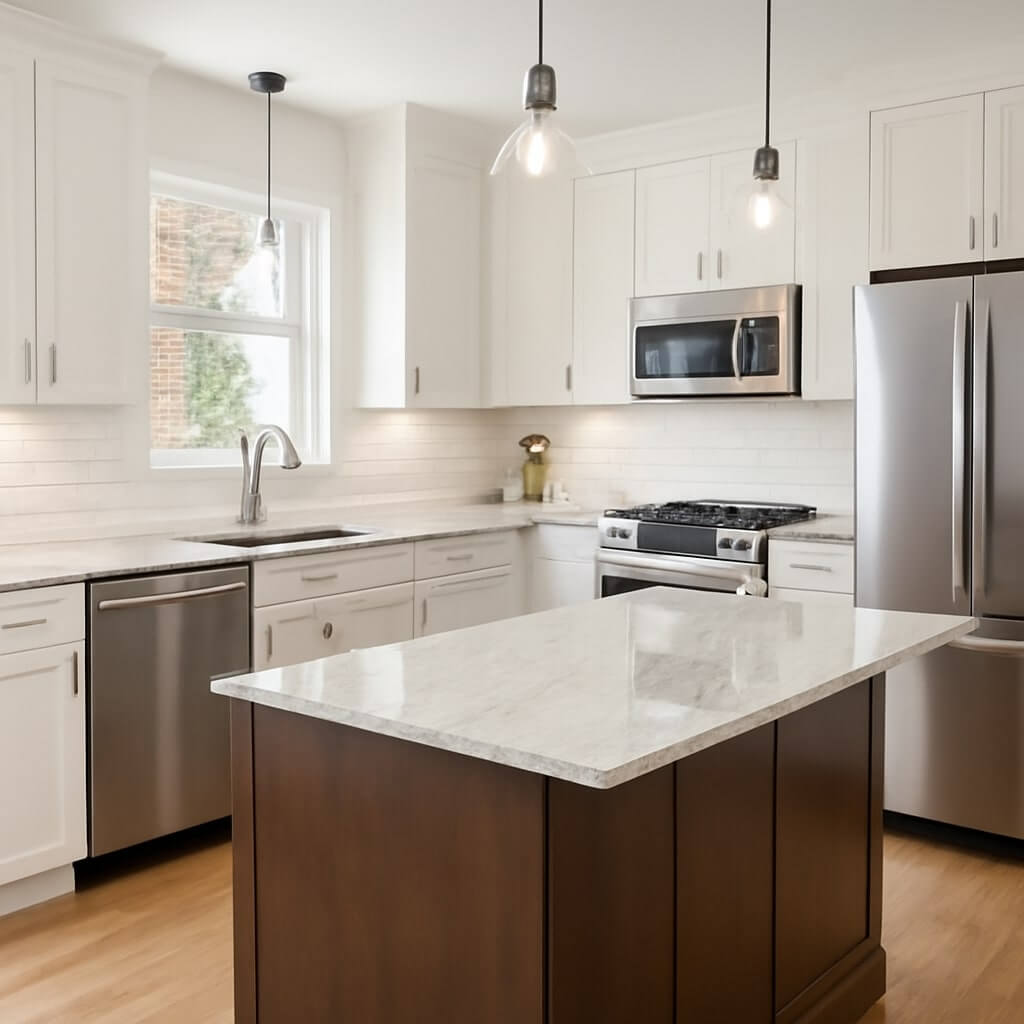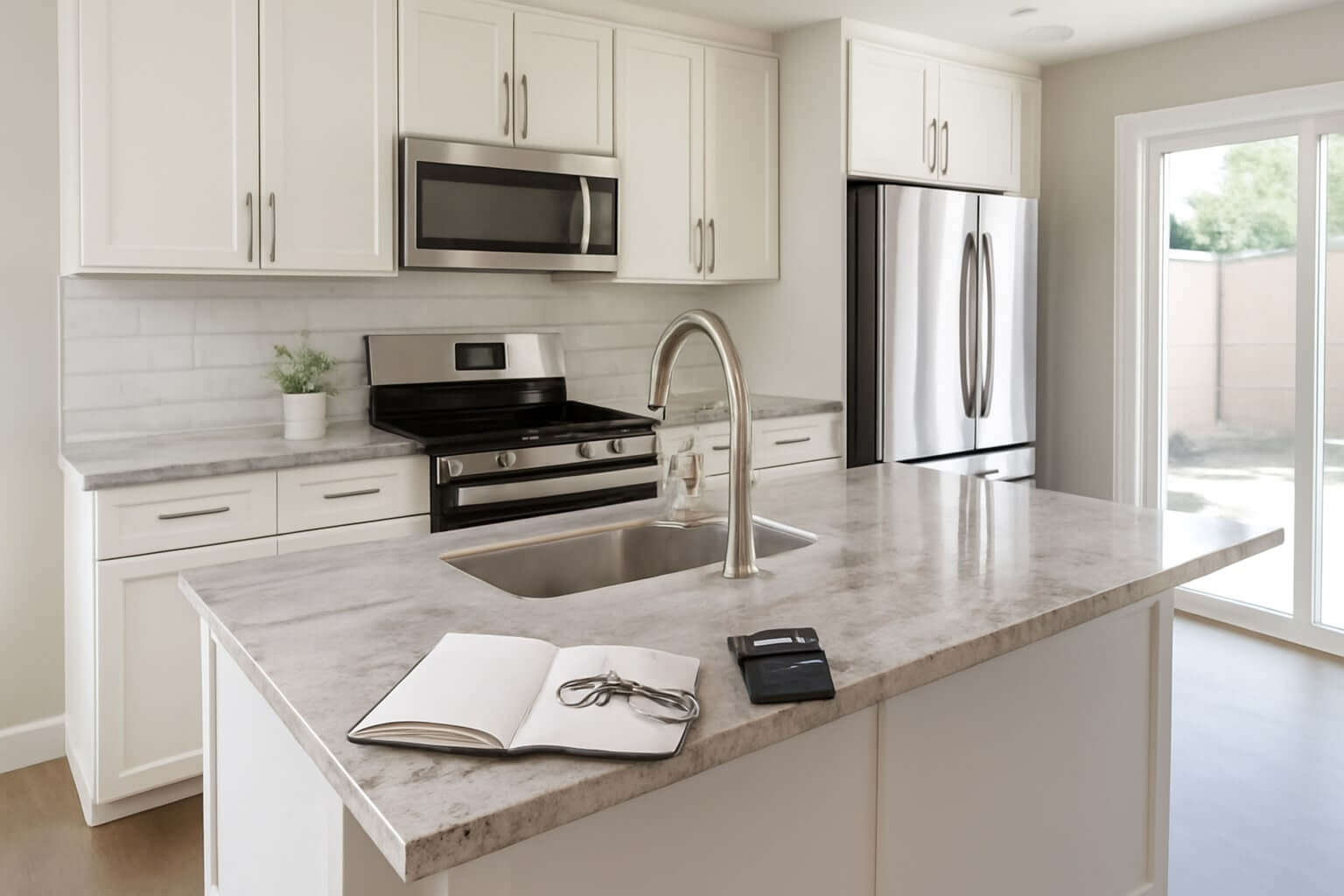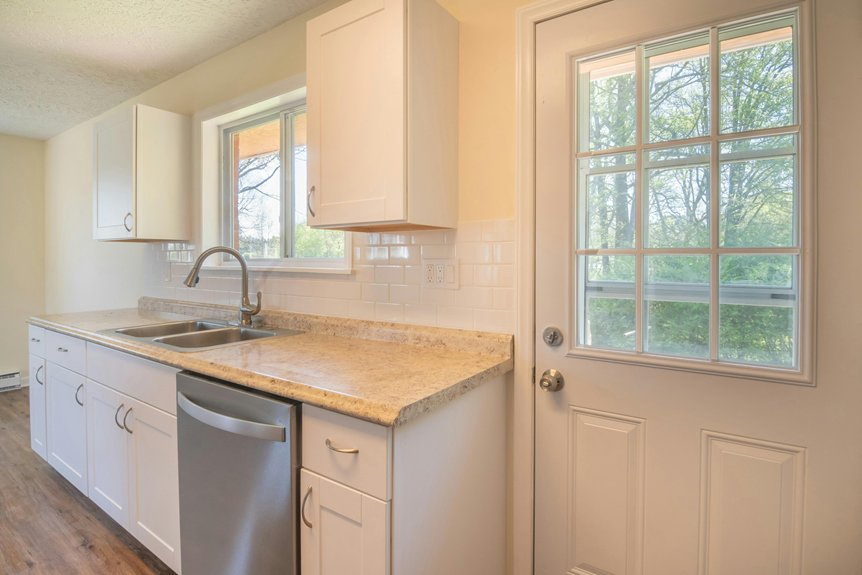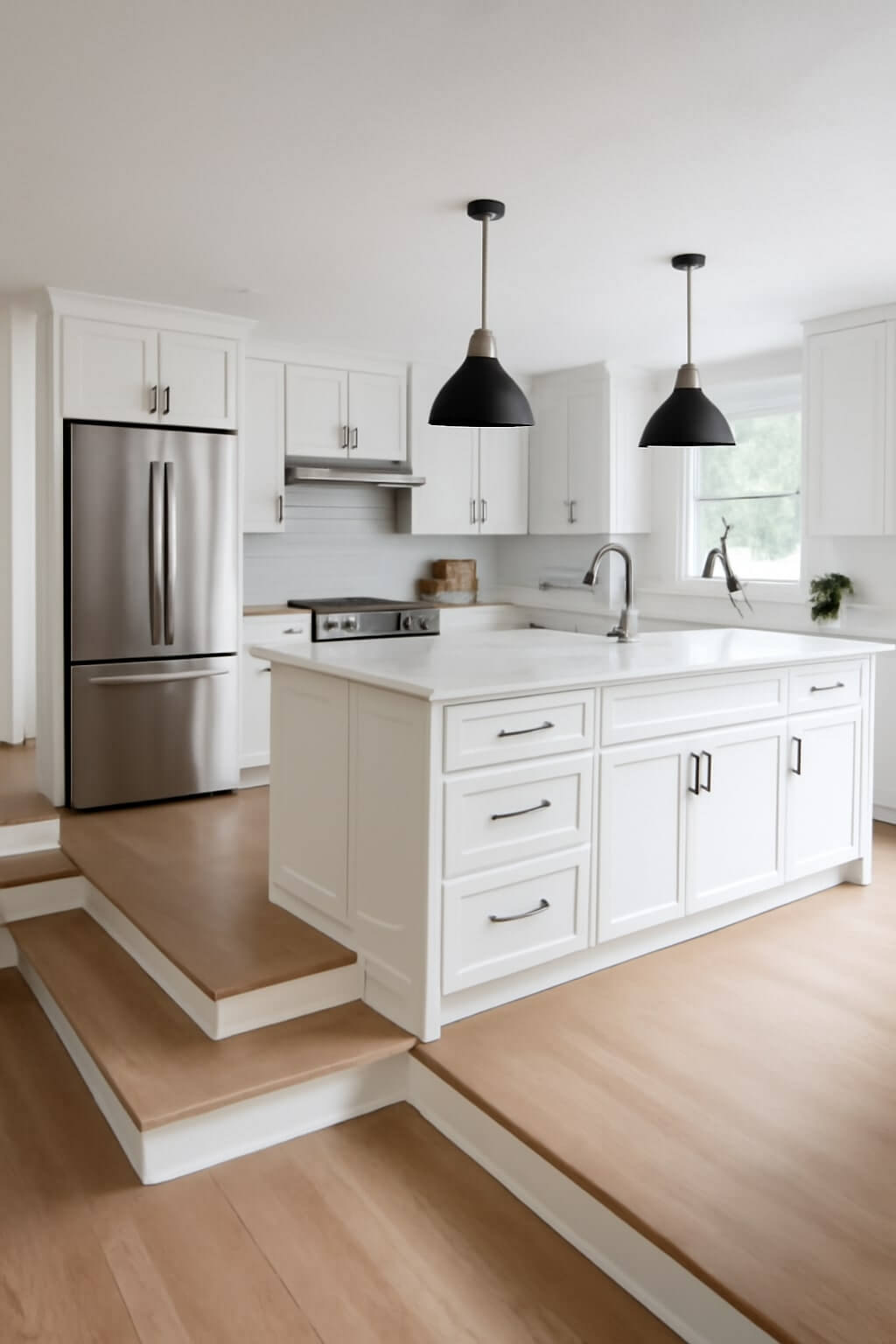When you’re planning a kitchen remodel in Toronto, several factors can greatly impact your budget. The size of your kitchen, the materials you choose, and the complexity of the design all play essential roles. You’ll also need to take into account labor costs, appliances, and local regulations. Understanding these elements can help you make informed decisions. But there’s more to it than just numbers—let’s explore how each factor comes into play.
Key Takeaways
- Kitchen size and design complexity significantly impact material and labor costs, with larger kitchens generally requiring higher budgets.
- The choice of materials, such as countertops and cabinetry, affects both functionality and overall kitchen aesthetics, influencing renovation expenses.
- Labor costs, which vary by tradesperson experience and project duration, represent a substantial portion of the total remodeling budget.
- Permits and local regulations must be considered to avoid unexpected expenses and project delays, especially in Toronto.
- Traffic patterns and parking challenges can complicate contractor access, potentially extending project timelines and increasing costs.
Size of the Kitchen
When considering a kitchen remodel, the size of your kitchen plays a vital role in determining both the scope of the project and the associated costs. A larger kitchen offers more opportunities for an expansive kitchen layout, but it can also increase expenses due to more materials and labor.
Space optimization becomes essential in smaller kitchens, where every inch counts. You’ll need to evaluate storage solutions and layout efficiency to maximize functionality.
Prioritize your needs and preferences to guarantee that your remodel not only meets your aesthetic desires but also enhances the usability of your kitchen, regardless of its size.
Choice of Materials
When it comes to your kitchen remodel in Toronto, the choice of materials can greatly impact both aesthetics and budget.
Selecting the right countertop, understanding cabinet quality differences, and exploring various flooring options are essential steps in creating a functional and stylish space.
Each decision you make won’t only affect the look of your kitchen but also its durability and maintenance needs.
Countertop Material Selection
Choosing the right countertop material is essential for both functionality and aesthetics in your kitchen remodel.
When comparing granite vs. quartz, consider durability and maintenance. Granite offers natural beauty and unique patterns, but it may require sealing, while quartz is non-porous and low-maintenance.
Think about your budget considerations too; granite can be more affordable initially but may incur additional upkeep costs. Quartz typically has a higher upfront cost but pays off in longevity and ease of care.
Cabinet Quality Differences
After selecting the right countertop, the next critical element in your kitchen remodel is the choice of cabinets, which can greatly impact both functionality and aesthetics.
Understanding cabinet quality differences is essential, as it influences durability and style. Here are key factors to evaluate:
- Cabinet Styles: Choose between shaker, flat-panel, or raised-panel designs based on your kitchen’s theme.
- Cabinet Finishes: Opt for paint, stain, or laminate, each offering distinct looks and maintenance levels.
- Material: Solid wood, plywood, or MDF can affect longevity and cost.
- Hardware: Quality hinges and handles enhance both function and appearance.
Flooring Options Impact
Selecting the right flooring can greatly influence your kitchen’s overall look and functionality.
Tile is known for its durability, offering a long-lasting option that can withstand heavy foot traffic and spills. It’s ideal if you’re looking for a classic, elegant touch.
On the other hand, vinyl is a practical choice with low maintenance needs, making it easy to clean and replace if necessary.
Consider your lifestyle and budget when choosing between these materials. Investing in quality flooring can enhance your kitchen’s aesthetic while ensuring it remains functional for years to come.
Make the choice that best fits your needs.
Labor Costs
Labor costs can greatly impact your kitchen remodel budget in Toronto, often accounting for a substantial portion of the overall expenses.
Labor costs significantly influence your kitchen remodel budget in Toronto, often representing a large share of total expenses.
The local labor market and wage fluctuations can notably affect what you’ll pay for skilled workers. Here’s what to take into account:
- Hourly Rates: Different tradespeople charge varying hourly rates based on experience.
- Project Duration: Longer projects can lead to increased labor costs.
- Seasonal Demand: Busy seasons may raise labor prices due to high demand.
- Specialized Skills: Experts in certain areas may command higher wages.
Understanding these factors can help you budget effectively for your remodel.
Design Complexity
When you consider a kitchen remodel, the design complexity can greatly influence both the aesthetic outcome and the overall cost.
If you opt for intricate design trends, like custom cabinetry or unique layouts, expect higher expenses. A functional layout is essential, but adding features like an island or open shelving can complicate the project.
Each element requires careful planning and skilled labor, which can increase your budget. Balancing your style preferences with practicality will lead to a beautiful kitchen that meets your needs without breaking the bank.
Appliances and Fixtures
A well-designed kitchen isn’t complete without the right appliances and fixtures, which can greatly impact both functionality and budget.
A well-designed kitchen requires the right appliances and fixtures to enhance both functionality and budget.
When selecting these elements, consider energy efficiency and your overall aesthetic. Here are four key factors to keep in mind:
- Appliance Type: Choose between standard or luxury brands, balancing quality with price.
- Energy Ratings: Opt for appliances with high energy efficiency to save on long-term costs.
- Size and Fit: Confirm appliances fit your space without sacrificing design.
- Fixture Quality: Invest in durable fixtures that complement your kitchen’s style and function.
Permits and Regulations
Before diving into your kitchen remodel, it’s essential to understand the permits and regulations that govern renovations in Toronto.
You’ll likely need various permit types, such as building permits for structural changes or plumbing permits for new fixtures. Failing to secure these can lead to costly fines and delays.
Regulation costs can also add up, so budget accordingly. It’s wise to consult the City of Toronto’s website for the latest requirements and fees.
Location and Accessibility
When you’re planning a kitchen remodel in Toronto, your location can greatly affect costs and logistics.
Urban areas often have stricter permit regulations, which can complicate your project, while suburban locations might present accessibility challenges for contractors.
Understanding these factors helps you budget more effectively and streamline the remodeling process.
Urban vs. Suburban Areas
In Toronto, your kitchen remodel costs can vary considerably based on whether you’re in an urban or suburban area.
Urban demographics often drive higher prices due to limited space and demand, while suburban preferences lean towards larger layouts and more extensive renovations.
Here are key factors influencing costs:
- Labor Costs: Urban areas may charge more for skilled labor.
- Material Availability: Suburban locations might’ve better access to bulk materials.
- Design Trends: Urban styles may require unique, custom features.
- Transportation: Accessibility impacts delivery fees for materials in urban settings.
Understanding these factors helps you budget effectively.
Permit Regulations Impact
Maneuvering permit regulations can greatly impact your kitchen remodel costs, especially depending on your location and accessibility.
In Toronto, you’ll need to navigate various building codes and zoning laws that dictate what can be done. If you live in an area with strict regulations, the costs can add up quickly.
For instance, obtaining permits might require additional inspections or modifications to meet specific standards. Additionally, if your property is harder to access, it can lead to increased fees and delays.
Understanding these factors beforehand can help you plan your budget more effectively and avoid unexpected expenses during your remodel.
Contractor Accessibility Challenges
Maneuvering contractor accessibility challenges can greatly influence your kitchen remodel’s overall cost and timeline.
When planning, consider these factors:
- Location: Your home’s distance from contractors can affect their availability and travel costs.
- Traffic: High traffic areas can delay project scheduling, extending completion time.
- Parking: Limited parking may lead to additional fees or logistical issues for contractors.
- Site Conditions: Accessibility to your kitchen space can impact labor efficiency and equipment transport.
Addressing these challenges early will help guarantee a smoother renovation process and keep your project on track.
Conclusion
To sum up, understanding these seven key factors can help you effectively plan your kitchen remodel in Toronto. By considering the size of your kitchen, your choice of materials, and labor costs, you can create a realistic budget. Don’t forget about design complexity, appliances, permits, and the impact of your location on accessibility. By keeping these aspects in mind, you’ll be better equipped to make informed decisions and avoid unexpected expenses throughout your remodeling journey.




